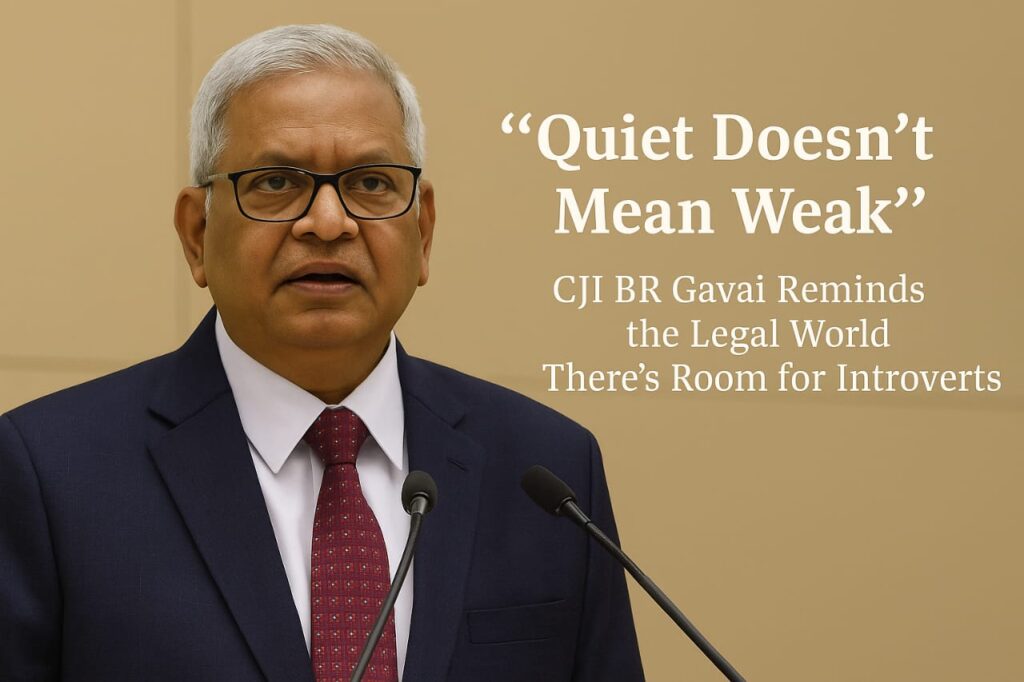Akhya Pandey
In a profession known for its loud voices and forceful arguments, Chief Justice of India BR Gavai’s message comes as a quiet revolution. On July 12, he reminded everyone that not all strength is loud, and not all impact Is visible. His words acknowledged the quiet, the anxious, the introverted — voices that are often left out of the spotlight in the legal world.
In a powerful and reassuring message, Chief Justice of India BR Gavai has challenged a stereotype that many law students and young professionals silently struggle with — that the legal profession is not meant for introverts.
Addressing a gathering on July 12, CJI Gavai said,
“To those who are quiet, introverted, or anxious, I see you. The legal profession often feels loud, but strength is not always measured in decibels. It lies in clarity, in insight, in depth.”
These words hit home for many in the legal community who may not speak the loudest in the room but are equally, if not more, thoughtful and capable. CJI Gavai’s remarks serve as a quiet but firm rejection of the belief that legal success only comes to the most outspoken or aggressive.
This recognition is important in a field where courtroom drama and vocal dominance are often glorified. Law students are taught to argue, debate, and project confidence — but little is said about the value of deep thinking, careful listening, and well-crafted written arguments. CJI Gavai reminded everyone that being effective doesn’t require being loud.
While no specific case was mentioned in his speech, the idea resonates with judicial conduct seen in past verdicts. In Shayara Bano v. Union of India (2017) 9 SCC 1, Justice Rohinton Nariman’s judgment didn’t rely on theatrics. It stood out because of its intellectual sharpness and constitutional clarity — an example of how depth, not volume, can shape landmark decisions. Similarly, Justice D.Y. Chandrachud’s opinion in Navtej Singh Johar v. Union of India (2018) 10 SCC 1, spoke of dignity and space for individuality. In a way, it echoed what the CJI is now reminding us — that the legal world should make room for all kinds of voices, including the quieter ones.
Perhaps the most striking example of what CJI Gavai spoke about comes from the historic dissent of Justice H.R. Khanna in ADM Jabalpur v. Shivkant Shukla (1976) 2 SCC 521. His words, delivered in silence and solitude against the majority, now live on as a defining moment in our constitutional journey. His courage didn’t need noise. It needed conviction. The same spirit is reflected in Delhi Judicial Service Association v. State of Gujarat (1991) 4 SCC 406, where the Court upheld judicial independence with quiet authority, underscoring that integrity doesn’t require aggression.
The Chief Justice’s message also comes at a time when conversations around mental health, anxiety, and performance pressure in legal education and practice are becoming more open. Many young advocates and law students, especially from small towns or non-English-speaking backgrounds, often hesitate to speak up — not for lack of knowledge, but for fear of not being loud or fluent enough.
By saying, “I see you,” CJI Gavai has given validation to thousands who feel unseen in a system that often rewards noise over nuance.
His statement is also a subtle invitation to law schools, bar councils, and law firms to rethink how they evaluate talent. Oral advocacy may be essential, but it’s just one part of the profession. Legal drafting, meticulous research, strategic thinking — these often require silence, not spotlight.
In a profession that’s frequently measured in arguments and appearances, the CJI’s message is a reminder that clarity matters more than volume, and insight more than interruption.
Click here to access Judgement: Click Here.
Click Here to Access Order: Shayra Bano
Instagram: Click Here.
LinkedIn: Click Here.
For Collaboration and Business: Click Here.

